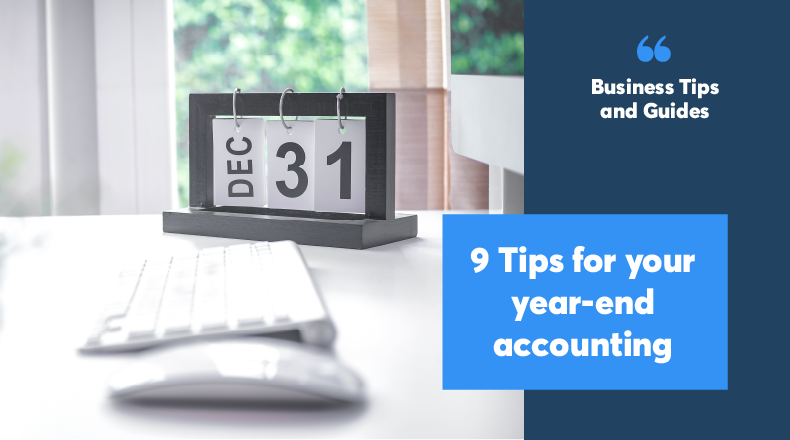With the end of the calendar year almost upon us, many business owners will be pretty glad to see the back of 2021. With Covid-19 restrictions effecting many businesses, it’s been a tough year. So, while we raise a glass to you, to celebrate the fact that you’ve got through 2021, we thought we’d also take the opportunity to give you some tips on how to ensure you make the most out of your year-end accounting.
For most, company tax returns are generally due by February 28 each year (if not lodging through a registered tax agent). But before you start to panic, it’s worth remembering that if your business has a turnover of less than $2M per year, this is a great opportunity for you to access a wide range of tax benefits within areas such as Capital Gains Tax, Income Tax, Goods and Services Tax, and Fringe Benefits Tax.
Here are 9 tips to help you make the most out of your year-end accounting.
Tip 1 - Make sure your paperwork is up to date
Having important paperwork in place helps to streamline the EOFY process. Some examples of records you need are:
- Receipts for sales and purchases.
- Records concerning tax returns, activity statements and employee super contributions.
- GST returns and Business Activity Statements (BAS).
If you’re not known for your filing, now is a good time to go through that paperwork and get everything in order ahead of doing your return.
Tip 2 - Simplify your accounting with online tools
Both EOFY and BAS (business activity statement) time will be simpler if you separate your personal banking from your business banking. This helps you capture all your business expenses in one place, while avoiding the risk of accidentally claiming for a purchase that’s not connected with your business. Having a separate business bank account also helps you manage your business cash flow better.
Tip 3 - Pay super owing before 30 June
Businesses must ensure they are paying employees additional superannuation. As superannuation is not tax deductible until it has been paid, it is also important to ensure all superannuation payments owing are completed on time (FYI, this is a great way of reducing your income tax bill).
Tax Planning & Business Consultations
Book a Tax Planning or Business Consultation and create a business plan and tax strategy for the new year.
Tip 4 - Get your tax-deductible expenses in order
An easy way for businesses to claim tax deductions is to pre-pay relevant services and supplies such as office supplies or costs for supplier services, such as accountant fees, up to a period of 12 months or less. By bringing forward tax-deductible expenses and deferring income, you can reduce your taxable income for the financial year.
Tip 5 - Manage your deductions
Ensuring you get the right deductions for your expenses makes good business sense, so it’s important to find out what you can claim.
For instance, you may wish to take advantage of the federal government’s popular instant asset write-off scheme for small businesses. The instant asset write-off is normally only available for all businesses with an annual turnover of less than $500 million, however for the 2020-21 & 2021-22 years, this cutoff has been increased to $5 billion in turnover.
This is part of the temporary recovery measures for COVID-19, so it may be a great time to consider whether you need new office equipment, etc. in the coming year.
Tip 6 - Check for other COVID-19 reliefs and impacts
COVID-19 has resulted in very fluid government initiatives such as Job Keeper and these payments may have impacted your EOFY tax situation. For the latest information, refer to the ATO’s COVID-19 support for businesses web page.
You may also wish to seek professional advice from your accountant regarding the tax and superannuation implications of COVID-19 business relief.
Tip 7 - Keep your income producing assets up-to-date
You can reduce operating costs, increase productivity, and free up cash by structuring your financing and repayments to suit your tax and cash flow needs. Try to keep your income producing assets up-to-date, as this helps keep your business operationally efficient and can help maximise your cash flow.
Tip 8 - Write off bad debts
If you pay GST on an accrual’s basis, you can claim back the tax you’ve already paid on what’s turned out to be a bad debt. To receive a refund of the GST previously paid, make sure you include the bad debt in your June quarter BAS or annual GST Return.
Tip 9 - Reassess your cash position
Starting the year with a healthy cash position is crucial. Ensure you review your cash management processes and consider the most appropriate funding solutions. There are a number of cash flow finance tools to help you better manage cash flow and funding. Invoice finance is gaining in popularity as it provides advances of up to 95% against receivables without needing real estate security, and is scalable in line with the sales growth of the company.
Bonus Tip - Be aware of due dates!
It sounds simple, but by putting all the required financial submission and reporting dates in your calendar to give yourself a reminder, you’ll avoid those nasty ATO penalties. Late lodgements for SMEs are charged at 1 penalty unit per day overdue with the value ranging from $110 – $222 per unit depending on the date of infringement.
And finally...
Pulling together everything you need for your tax return can be arduous, but the team at POP Business are ready to lend a hand. Our qualified experts can undertake the work required for you to complete your company tax return as well as deliver advice and support at every stage of your growth. Call us to find out more today on 1300 180 630.

